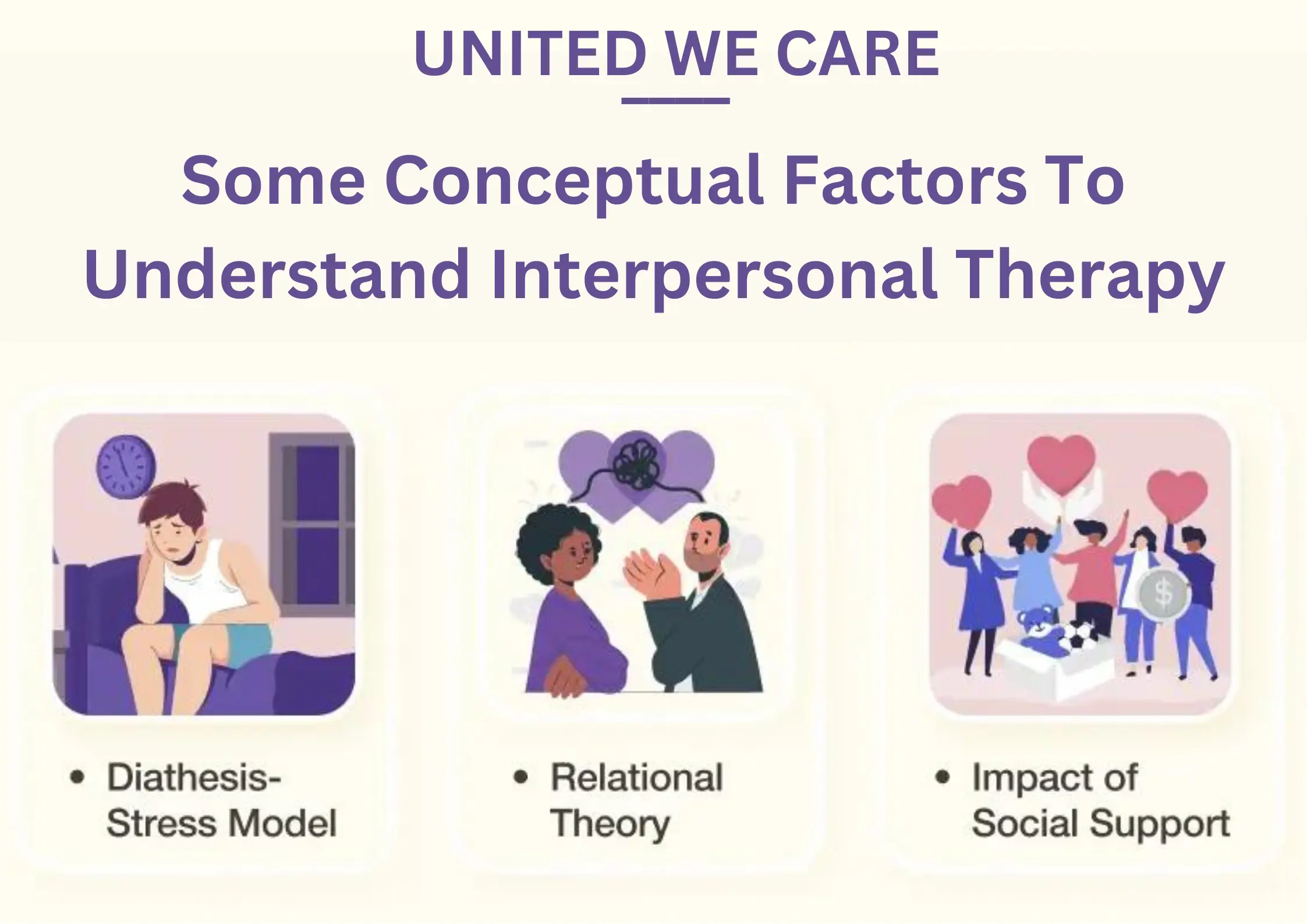Introduction
Interpersonal therapy focuses on interpersonal relationships. This kind of therapy uses the context of these relationships to highlight precipitating and perpetuating factors of mental illness. Moreover, it also looks for solutions within these relationships to strengthen the individual’s network of support.
Typically, interpersonal therapy is designed to be conducted over a specific amount of time. This makes it a highly practical and doable form of psychotherapy. According to research, the benefits of interpersonal therapy for depressive disorders are even higher than that of CBT [1].
What is Interpersonal Therapy?
As mentioned above, interpersonal therapy focuses on an individual’s relationships and uses that as a context for treatment.
The following are some conceptual factors to consider when trying to understand interpersonal therapy [2].
Some Conceptual Factors To Understand Interpersonal Therapy

Diathesis-Stress Model
This widely accepted model forms the foundation for interpersonal therapy. It proposes that mental illnesses develop when an individual has a predisposition for it and is then exposed to stressful life events. Factors that make a person vulnerable to this include genetics, prenatal trauma, and adverse childhood experiences.
Relational Theory
According to relational theory, it’s not just our relationships that impact us but also our internalized patterns of relating. Typically, someone suffering from depression tends to have low self-esteem and self-worth. Often, this is rooted in insecure attachment, emotional neglect, and attachment trauma. Each of these is linked to relationships. Therefore, relational theory makes interpersonal therapy have a meaningful contribution to the treatment of depression.
Impact of Social Support
Lastly, research shows that having social support in life can have an alleviating effect on clinical depression [3]. Hence, it makes sense for interpersonal therapy to focus on how to establish or re-establish a person’s interpersonal support. As a consequence, the individual’s resilience to stressors improves along with a feeling of connection rather than isolation.
Dynamic Interpersonal Therapy
Because of the similarity in names, people often tend to confuse dynamic interpersonal therapy as a subset or branch of interpersonal therapy. However, it is important to understand that both these types of therapy are different and involve separate techniques.
Dynamic interpersonal therapy is a treatment approach based on a combination of evidence-based psychodynamic treatments along with manualized approaches [4]. Psychodynamic or psychoanalytic brief therapy contextualizes mental illness into early childhood psychosexual experiences. When distilled into a manualized approach, it forms dynamic interpersonal therapy.
How is Interpersonal Therapy Useful for Depression?
In this section, we’ll take a closer look at how interpersonal therapy can be useful for depression. Each of these contributes to the gradual alleviation of depressive symptoms.
Enhancing Social Support
Firstly, as mentioned above, interpersonal therapy helps the individual identify and solidify a network of social support. Usually, this involves understanding who a person can rely on and how to enrich the relationship with that person. It may also involve identifying what role the individual plays in preserving a relationship and following through on it.
Decreasing Interpersonal Stress
Secondly, interpersonal therapy gives space to the individual to openly discuss how their interpersonal relationships may be causing stress. Through these guided conversations, the individual finds a way to destress, vent, and identify coping strategies.
Improving Emotion Regulation
Thirdly, interpersonal therapy offers the client several new ways to recognize and process their emotions. As a lot of interpersonal stress leads to emotional dysregulation, this treatment approach equips them with helpful skills to calm down and regulate their emotions.
Increasing Interpersonal Skills
Finally, interpersonal therapy trains the individual in a number of interpersonal skills that help them recover better. Depression tends to make a person isolate, have distorted thinking, and become socially withdrawn. Consequently, interpersonal therapy undoes these effects, significantly improving the client’s interpersonal skills.
Interpersonal Therapy Near Me
There are multiple ways to get interpersonal therapy if this treatment approach interests you. Ideally, it is best to find an offline option, such as through a psychiatric hospital or mental health clinic near you. Any licensed therapist trained in interpersonal therapy is qualified to conduct this treatment.
However, if offline options aren’t available for you, you can also seek online therapy. United We Care is a mental health super app where you can find your choice of experts to administer interpersonal therapy.
Conclusion
Interpersonal Therapy is a type of psychotherapy. It focuses on a person’s interpersonal relationships. Theoretically, it is based on the psychological concepts of the diathesis-stress model, relational theory, and social support. This can be a very helpful therapy for disorders with depressive symptoms. By enhancing social support, decreasing interpersonal stress, improving emotional regulation, and increasing interpersonal skills, interpersonal therapy helps alleviate symptoms of depression.
References
[1] de Mello, M.F., de Jesus Mari, J., Bacaltchuk, J. et al. A systematic review of research findings on the efficacy of interpersonal therapy for depressive disorders. Eur Arch Psychiatry Clin Neurosci 255, 75–82 (2005). https://doi.org/10.1007/s00406-004-0542-x
[2] Lipsitz, J.D. and Markowitz, J.C., 2013. Mechanisms of change in interpersonal therapy (IPT). Clinical psychology review, 33(8), pp.1134-1147.
[3] Brown, G.W. and Andrews, B., 1986. Social support and depression. In Dynamics of stress: Physiological, psychological and social perspectives (pp. 257-282). Boston, MA: Springer US.
[4] Lemma, A., Target, M. and Fonagy, P., 2010. The development of a brief psychodynamic protocol for depression: Dynamic Interpersonal Therapy (DIT). Psychoanalytic Psychotherapy,, 24(4), pp.329-346.
[5] Lemmens, L.H., Arntz, A., Peeters, F.P. et al. Effectiveness, relapse prevention and mechanisms of change of cognitive therapy vs. interpersonal therapy for depression: Study protocol for a randomised controlled trial. Trials 12, 150 (2011). https://doi.org/10.1186/1745-6215-12-150









